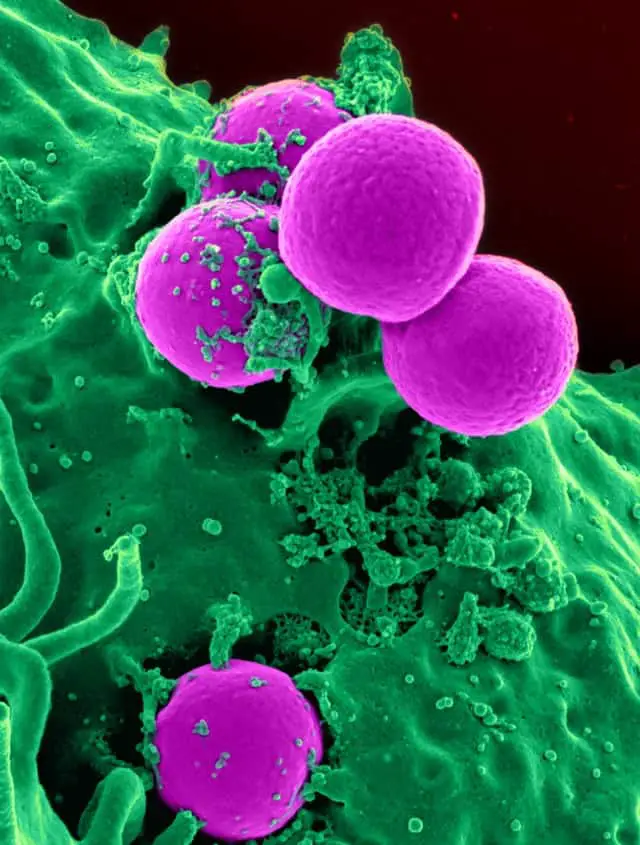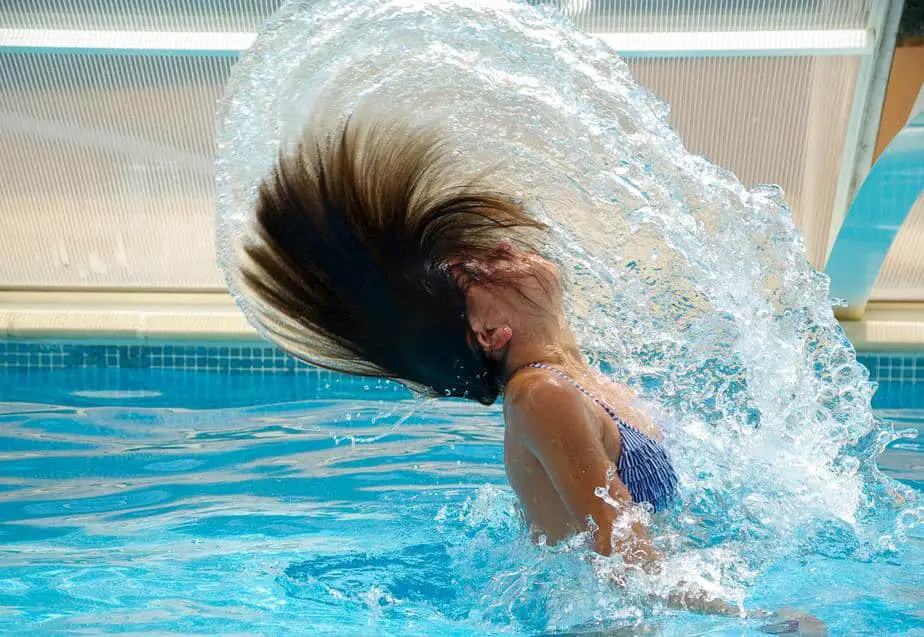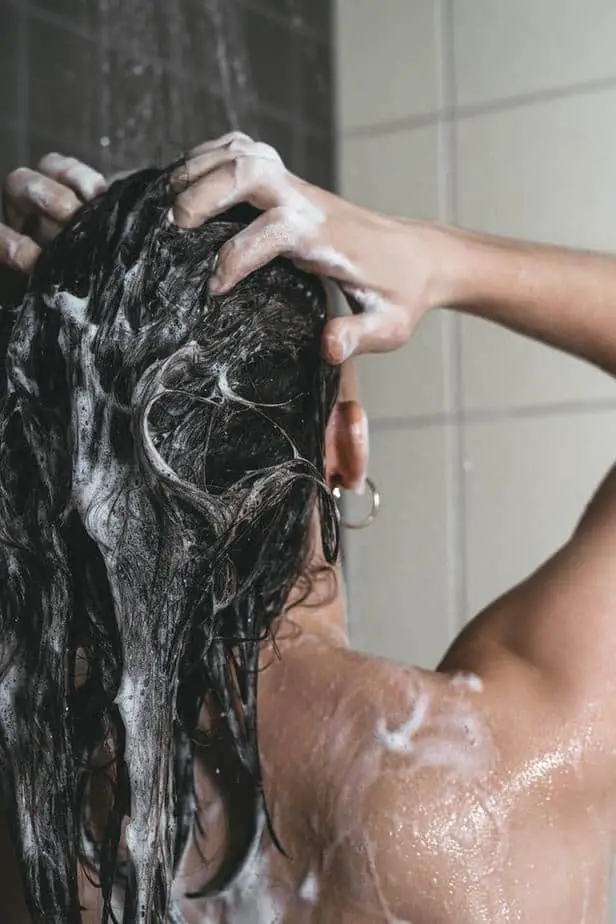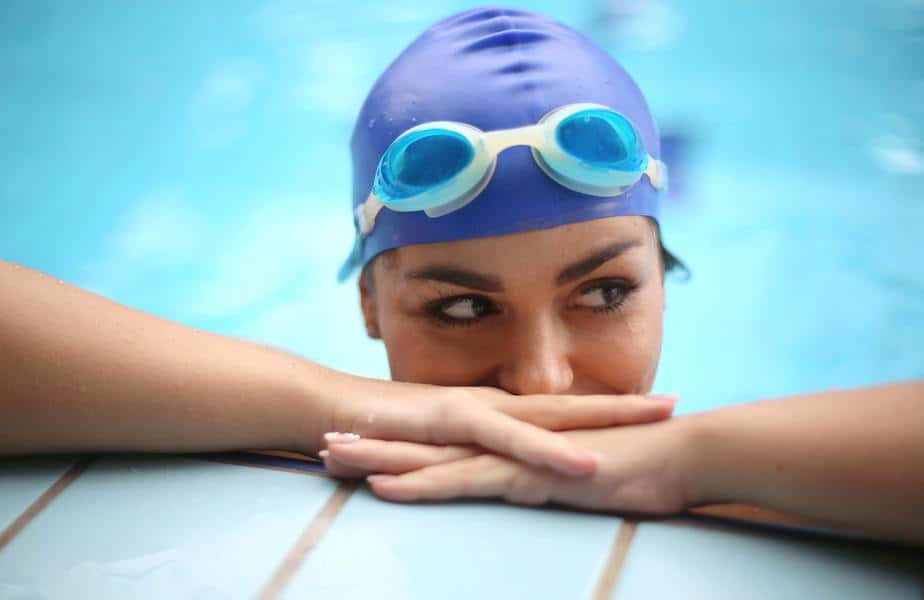There were many times when I was feeling dead tired after swim practice, to the point where I was seriously considering not washing my hair thoroughly until the next morning. I’m sure I’m not the only person who has thought this, and this is a dilemma that many swimmers face now and will in the future as well.
If you are someone who swims often, it’s imperative that you are taking good care of your hair. Repeated exposure to chlorine can lead to undesirable effects, especially if you have dyed hair. Chlorine is well known for turning blonde hair green, and it can strip your hair of its natural oils and remove moisture.
It’s generally not a good idea to leave chlorine in your hair for any period of time because it can dry out your hair and make it very brittle, resulting in breakage. If you choose to leave the chlorine in your hair overnight, your scalp will become very itchy which will probably make it hard for you to fall asleep in the first place.
When you have the opportunity, you should remove the chlorine from your hair as soon as possible. Rinsing it with just water is not enough to remove all the chlorine; you should use chlorine removal shampoo to get it all out. If you have a pet that loves to jump into the pool, such as a dog, then it is your responsibility as the owner to wash your dog with shampoo and conditioner.
In this article, we will talk about the negative effects chlorine has on hair, how you can thoroughly remove it, and why you should not leave it in your hair overnight.
What does chlorine do?

To put it simply, chlorine is added into water to kill bacteria that can cause infections and disease.
All swimming pools open to the public are disinfected with chlorine because you don’t know what kind of germs or other nasties the other swimmers are bringing into the water with them.
While the amount of chlorine in swimming pools is not fatal to humans, it’s still enough to cause damage to your skin and hair. While undesirable, it’s the lesser of two evils when you consider how bad it’d be if you were swimming in unchlorinated water.
As for what’s happening on a microscopic level, chlorine kills off bacteria by breaking down their cell walls. This is done through oxidation reactions which occur when chlorine combines with metal ions like iron and organic matter. The result is chloramines, which is responsible for that “chlorine smell” that is often associated with swimming pools.
Why is chlorine bad for our hair and skin?

Constant exposure to chlorinated water can result in dry, unhealthy, and brittle hair. Another common side effect is an itchy or irritated scalp.
Due to the nature of chlorine being a corrosive chemical, it will strip away the natural oils that your hair produces which is essential in maintaining its luster and durability. Without a protective layer of oil, each strand will be left exposed to the dry air, which can cause its moisture levels to reduce greatly.
Similarly, the oils removed from your skin can leave it dry, cracked, and itchy or irritated depending on how sensitive your skin is.
A very infamous interaction chlorine has with blonde or light hair colors is that it can turn them green. That might actually be desirable in today’s zeitgeist, but for some others this can be a nightmare.
What’s happening is that the copper and chlorine in the water bond together and form a new bond. This bond sticks on the protein present in your hair strands, and the end result is a green color.
Thankfully, these side effects are minor and will not lead to any permanent damage. Furthermore, there are many precautions you can take to limit the amount of chlorine your hair is exposed to. If you’re careful, you can completely avoid the downsides of chlorine even if you’re swimming everyday.
How often should swimmers wash their hair?

There are as many hair care routines as there are people. Under normal circumstances some people wash their hair everyday, some every other day, some 1-2 times a week, and some people only rinse their hair with water, never using shampoo.
Generally, people with longer hair wash their hair less often because it’s a pain to wash and dry that much hair. Conversely, it’s much easier for people with short hair to justify washing their hair everyday since it’s much less of a hassle.
That said, if you spend most of your day in the pool or ocean where you are exposed to chlorine or salt, that can certainly influence how often you will want to wash your hair. Ideally, you should be washing your hair immediately after swimming in the pool or ocean.
If you spend long enough in the water, your hair can absorb the water (along with chlorine and other chemicals present in the water) so that it’s not just on the exterior. If this is the case, rinsing it will not be enough to remove the chlorine from your hair.
You will need to use a special shampoo that is specifically designed to remove chlorine from hair (called chlorine-removal shampoos or clarifying shampoos) to more thoroughly clean the chlorine out of your hair.
Shampoos unfortunately also strip the hair of its natural oils, so you will need to replenish and moisturize your hair by using conditioner afterwards. The one-two punch of shampoo and conditioner is essential for keeping your hair moisturized and chlorine-free.
How to prevent chlorine damage

If you find it a pain in the butt to thoroughly wash your hair everyday to prevent chlorine damage, then you should perform the following tips to limit how much damage chlorine can do to your hair.
- Pre-soak your hair. Rather than allow chlorinated water or saltwater to be absorbed into your hair, rinse your hair with fresh water until it is saturated. Once saturated, it will be difficult for the undesirable water to get absorbed into your hair.
- Wear a swim cap. While swim caps are not designed to keep your hair dry, but they can certainly limit how much water reaches your hair. After soaking your hair, it will also make it easier to put on a swim cap.
- Apply leave-in conditioner or natural oils prior to entering the water. If you want even more protection, apply leave-in conditioner or natural oils such as coconut oil or jojoba oil to your hair. This will replenish the oil that was removed from your hair during rinsing and act as a protective layer while you’re swimming.
- Wash your hair one last time after swimming. Use chlorine removal shampoo and then apply a conditioner or natural oil to protect and moisturize your hair.
- Use a detangler. If your hair is all tangled up, don’t forcibly brush it without first applying some hair detangler. This can soften your hair and help it get disentangled without being damaged by the brush.
Parting words
It’s not recommended for you to leave chlorine in your hair overnight because it can make your hair dry, brittle, and eventually fall out. It will also have an undesirable chlorine smell which you don’t want to rub off on your clothing or pillow.
The best thing you can do for your hair after swimming is to remove the chlorine from your hair using a chlorine removal shampoo. Follow up with a good conditioner and perhaps a detangler and you are good to go.
Using chlorine removal shampoo is not strictly necessary but is highly recommended. You can also perform a few preventative measures to limit chlorine damage such as pre-soaking your hair and wearing a swim cap.
If you are unable to wash your hair immediately after leaving the pool, you can limit the damage by keeping your hair wet. If your hair dries with chlorine still in it, that’s when the chlorine will do the most damage. Follow these tips to keep chlorine damage to a minimum.
Last update on 2024-07-15 / Affiliate links / Images from Amazon Product Advertising API


